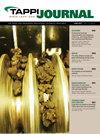用于人造丝生产的黄麻与毛石混合物的预水解硫酸盐制浆
IF 0.6
4区 农林科学
Q4 MATERIALS SCIENCE, PAPER & WOOD
引用次数: 1
摘要
通过改变时间和温度对黄麻切片、黄麻球粒和切割球粒混合物进行预水解,获得约90%的预水解产率。在170°C预水解60min的条件下,100%黄麻切片的产率为76.3%,而黄麻球童的产率仅为67.9%。但在150°C预脱水60min的情况下,黄麻切片的收率为90%,其中49.94%的原始戊聚糖溶解,在140°C预解60min的黄麻球童产生86.4%的固体残留物。Jute切割-caddis混合预水解在140°C下进行30分钟,在50:50切割-Cadtis混合物中产生92%的固体残留物,其中戊聚糖的溶解仅为29%。预水解的黄麻切片、黄麻球童和切割球童混合物随后进行硫酸盐蒸煮。在170℃预水解60min的条件下,100%黄麻切片的出浆率仅为40.9%,比140℃预水解低10.9%。在140°C预水解45min后进行硫酸盐蒸煮的黄麻切丁混合料中,从100%切丁到50%切丁,出浆率下降了3.3%,但75%切丁使出浆率降低了6.7%。随着黄麻切削用量的增加,混合浆的漂白性能得到改善。本文章由计算机程序翻译,如有差异,请以英文原文为准。
Prehydrolysis kraft pulping of jute cutting and caddis mixture for rayon production
Jute cutting, jute caddis, and cutting-caddis mixtures were prehydrolyzed by varying time and temperature to get about 90% prehydrolyzed yield. At the conditions of 170°C for 60 min of prehydrolysis, the yield for 100% jute cutting was 76.3%, while the same for jute caddis was only 67.9%. But with prehydrolysis at 150°C for 60 min, the yield was 90% for jute cutting, where 49.94% of original pentosan was dissolved and prehydrolysis of jute caddis at 140°C in 60 min yielded 86.4% solid residue. Jute cutting-caddis mixed prehydrolysis was done at 140°C for 30 min and yielded 92% solid residue for 50:50 cutting-caddis mixtures, where pentosan dissolution was only 29%. Prehydrolyzed jute cutting, jute caddis, and cutting-caddis mixtures were subsequently kraft cooked. Pulp yield was only 40.9% for 100% jute cutting prehydrolyzed at 170°C for 60 min, which was 10.9% lower than the prehydrolysis at 140°C. For jute cutting-caddis mixed prehydrolysis at 140°C for 45 min followed by kraft cooking, pulp yield decreased by 3.3% from the 100% cutting to 50% caddis in the mixture, but 75% caddis in the mixture decreased pulp yield by 6.7%. The kappa number 50:50 cutting-caddis mixture was only 11.3. Pulp bleachability improved with increasing jute cutting proportion in the cutting-caddis mixture pulp.
求助全文
通过发布文献求助,成功后即可免费获取论文全文。
去求助
来源期刊

Tappi Journal
工程技术-材料科学:纸与木材
CiteScore
1.30
自引率
16.70%
发文量
59
审稿时长
6-12 weeks
期刊介绍:
An internationally recognized technical publication for over 60 years, TAPPI Journal (TJ) publishes the latest and most relevant research on the forest products and related industries. A stringent peer-review process and distinguished editorial board of academic and industry experts set TAPPI Journal apart as a reliable source for impactful basic and applied research and technical reviews.
Available at no charge to TAPPI members, each issue of TAPPI Journal features research in pulp, paper, packaging, tissue, nonwovens, converting, bioenergy, nanotechnology or other innovative cellulosic-based products and technologies. Publishing in TAPPI Journal delivers your research to a global audience of colleagues, peers and employers.
 求助内容:
求助内容: 应助结果提醒方式:
应助结果提醒方式:


